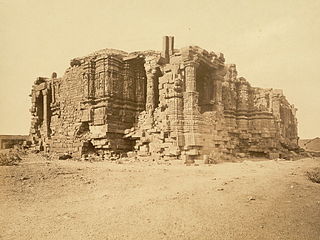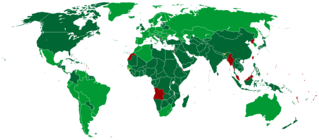A hate crime is a prejudice-motivated crime which occurs when a perpetrator targets a victim because of their membership of a certain social group or racial demographic.
Hate speech is defined by the Cambridge Dictionary as "public speech that expresses hate or encourages violence towards a person or group based on something such as race, religion, sex, or sexual orientation". Hate speech is "usually thought to include communications of animosity or disparagement of an individual or a group on account of a group characteristic such as race, colour, national origin, sex, disability, religion, or sexual orientation". Legal definitions of hate speech vary from country to country.

Religious intolerance is intolerance of another's religious beliefs or practices or lack thereof.
Race and ethnicity in the United States census, defined by the federal Office of Management and Budget (OMB) and the United States Census Bureau, are the self-identified categories of race or races and ethnicity chosen by residents, with which they most closely identify, and indicate whether they are of Hispanic or Latino origin.

The Civil Rights Act of 1968 is a landmark law in the United States signed into law by United States President Lyndon B. Johnson during the King assassination riots.

The Racial Discrimination Act 1975(Cth) is an Act of the Australian Parliament, which was enacted on 11 June 1975 and passed by the Whitlam government. The Act makes racial discrimination in certain contexts unlawful in Australia, and also overrides state and territory legislation to the extent of any inconsistency.
In criminal law, incitement is the encouragement of another person to commit a crime. Depending on the jurisdiction, some or all types of incitement may be illegal. Where illegal, it is known as an inchoate offense, where harm is intended but may or may not have actually occurred.

The Racial and Religious Hatred Act 2006 is an Act of the Parliament of the United Kingdom which creates an offence in England and Wales of inciting hatred against a person on the grounds of their religion. The Act was the Labour Government's third attempt to bring in this offence: provisions were originally included as part of the Anti-Terrorism, Crime and Security Bill in 2001, but were dropped after objections from the House of Lords. The measure was again brought forward as part of the Serious Organised Crime and Police Bill in 2004-5, but was again dropped in order to get the body of that Bill passed before the 2005 general election.
Incitement to ethnic or racial hatred is a crime under the laws of several countries.
The Racial and Religious Tolerance Act 2001 is an Act of the Parliament of Victoria, Australia, that makes behaviour that incites or encourages hatred, serious contempt, revulsion or severe ridicule against another person or group of people, because of their race or religion, unlawful in Victoria. The Act was passed during the premiership of Steve Bracks and went into effect on 1 January 2002.

The New South Wales Anti-Discrimination Act 1977 is an Act of the NSW Parliament, relating to discrimination in employment, the public education system, delivery of goods and services, and other services such as banking, health care, property and night clubs.

Sixteen European countries and Israel have laws against Holocaust denial, the denial of the systematic genocidal killing of approximately six million Jews in Europe by Nazi Germany in the 1930s and 1940s. Many countries also have broader laws that criminalize genocide denial. Among the countries that ban Holocaust denial, Austria, Germany, Hungary, Poland and Romania also ban other elements associated with Nazism, such as the display of Nazi symbols.
The House Behind the Cedars is a 1927 silent race film directed, written, produced and distributed by the noted director Oscar Micheaux. It was loosely adapted from the 1900 novel of the same name by African-American writer Charles W. Chesnutt, who explored issues of race, class and identity in the post-Civil War South. No print of the film is known to exist, and it is considered lost. Micheaux remade the film in 1932 under the title Veiled Aristocrats.

Hate speech laws in Canada include provisions in the federal Criminal Code, as well as statutory provisions relating to hate publications in three provinces and one territory.
The hate speech laws in Australia give redress to someone who is the victim of discrimination, vilification, or injury on grounds that differ from one jurisdiction to another. All Australian jurisdictions give redress when a person is victimised on account of colour, ethnicity, national origin, or race. Some jurisdictions give redress when a person is victimised on account of colour, ethnic origin, religion, disability, gender identity, HIV/AIDS status or sexual orientation.

The Race Relations Act 1965 was the first legislation in the United Kingdom to address racial discrimination.
Hate speech laws in England and Wales are found in several statutes. Expressions of hatred toward someone on account of that person's colour, race, sex, disability, nationality, ethnic or national origin, religion, gender reassignment, or sexual orientation is forbidden. Any communication which is threatening or abusive, and is intended to harass, alarm, or distress someone is forbidden. The penalties for hate speech include fines, imprisonment, or both.

The International Convention on the Elimination of All Forms of Racial Discrimination (ICERD) is a United Nations convention. A third-generation human rights instrument, the Convention commits its members to the elimination of racial discrimination and the promotion of understanding among all races. The Convention also requires its parties to criminalize hate speech and criminalize membership in racist organizations.
Racism in sport in Australia has a long history as stated by the Australian Human Rights Commission (AHRC). In 2006, the AHRC published the report What's the score? A survey of cultural diversity and racism, which stated that:
Hate speech is public speech that expresses hate or encourages violence towards a person or group based on something such as race, religion, sex, or sexual orientation. Hate speech is "usually thought to include communications of animosity or disparagement of an individual or a group on account of a group characteristic such as race, colour, national origin, sex, disability, religion, or sexual orientation".







